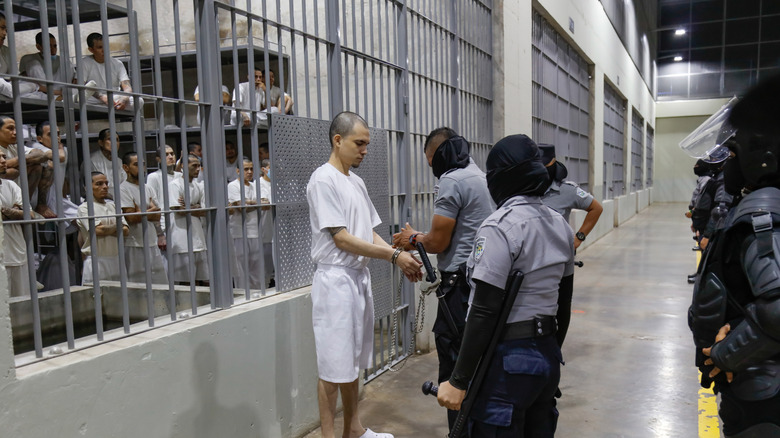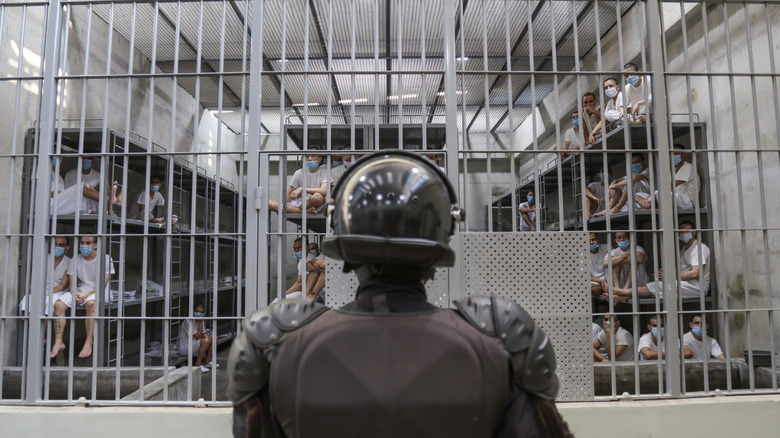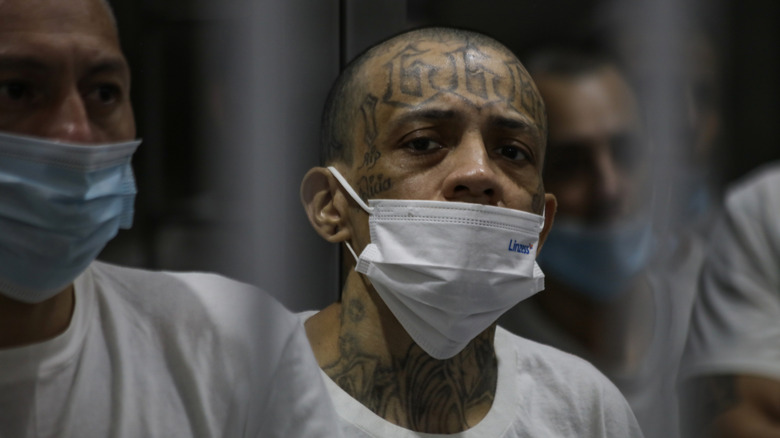What Life Is Like Inside El Salvador's Largest Prison
The lights stay on day and night. Prisoners are allowed out of their cells that house as many as 100 inmates for only half an hour a day and they aren't allowed outdoors. They can't see their lawyers in person, much less loved ones. And that's only scratching the surface. This is the reality of El Salvador's largest prison, Centro de Confinamiento del Terrorismo (CECOT) — the Terrorism Confinement Center. While the U.S. prison system has some dark secrets and real issues, like cramped conditions and rampant violence, compared with CECOT, it's Club Med.
El Salvador's president, Nayib Bukele, ordered the massive prison built in 2022. CECOT opened the next year in the town of Tecoluca. It can hold 40,000 inmates, all men, in its eight massive wings. Some of those incarcerated there have been convicted of crimes. Others are still waiting for trial dates as they sit in overcrowded cells without any personal possessions, their heads shaved, wearing prison-issued t-shirts and shorts. All allegedly have ties to various gangs. The country's justice minister Gustavo Villatoro said that officials "will make sure none of those who enter the Cecot ever leave on foot," per The Guardian.
This is the prison where President Donald Trump's administration sent 238 Venezuelan immigrants alleged to have ties to a gang to be held without trial.
A dangerous prison in a dangerous country
The small Central American country of El Salvador suffered through a tumultuous and violent past that included a bloody civil war and U.S.-backed right-wing death squads during Ronald Reagan's presidency. After a 1992 peace accord, the country began to stabilize. But in 2018, following several natural disasters, a faltering economy, and rampant crime, El Salvador earned the ignominious distinction of being named the most dangerous country in the world not at war by the World Economic Forum.
The next year, Nayib Bukele became president and implemented anti-gang measures that in 2022 included the declaration of a state of emergency that human rights organizations say has led to government abuses, including arbitrary arrests and torture.
The massive CECOT prison is a direct result of Bukele's anti-gang measures. The prison has been billed as the largest in Latin America and allegedly only holds gang members. The facility is surrounded by a series of electric fences and has 19 guard towers. Inside the walls of the massive prison complex that cost an estimated $115 million to build, the inmates have little space — less than 6.5 square feet each. Along with tight quarters, there have been allegations of inmate deaths and torture by guards.
A day in the life of a CECOT inmate
When an inmate first enters CECOT, they have their head shaved and are issued their meager prison clothes. Packed inside the cell with others, including members of some of the world's most dangerous gangs, including the notorious and violent Mara Salvatrucha or MS-13 gang, and their rival, Barrio 18, and they have nothing to do. Besides not being allowed any possessions, they can't even read a book. Some inmates may earn the right to read the Bible, but nothing more. The cells have metal bunk beds with no mattresses or pillows, an open toilet, and a concrete basin for washing up. The drinking water comes from plastic jugs and people imprisoned there eat their food with their hands. They're watched over by more than 1,000 armed guards from both the floor and catwalks above the cells.
During the half hour the inmates are let out of their cells they are allowed to walk the main hall wearing handcuffs and leg irons. Some inmates who earn the favor of the prison administration might be allowed out of their cells to give a motivational speech in the main hall to their fellow prisoners. They're not even allowed to go to court and instead are taken to a room inside the facility for video conferences. With no outside contact, many of the inmates' loved ones have no idea whether they're alive or dead. CECOT does have dining halls and gyms, but not for the prisoners. They're just for the guards.


